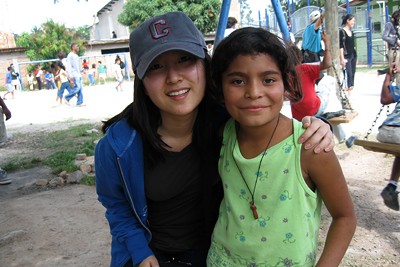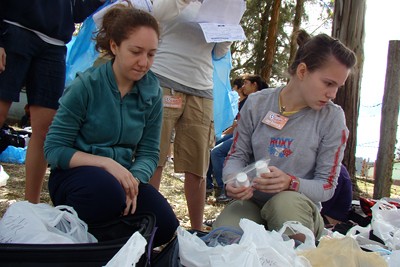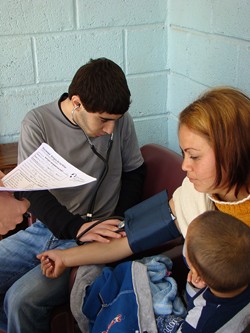Students form medical brigades that go to Honduras
By Nancy Doolittle
Leave it to a student majoring in biology, with a concentration in neurobiology and behavior, to launch a new student organization at Cornell that provides medical care to the impoverished in developing countries and get it established well enough to pass on to future student generations.
Such was Cornell senior Jane Rhyu's goal when she founded the Cornell chapter of Global Medical Brigades in 2008.
Global Medical Brigades is a program of Global Brigades Inc., the world's largest student-led global health and sustainable development organization. This international group helps students organize trips, or "brigades," to selected developing countries, where they set up mobile medical units to provide care to people who rarely see doctors, mostly in rural areas where doctors are at least 20 miles away.
Rhyu, who is going to medical school in the fall, had heard about the program in January 2008, and by the early fall, she and several friends had established a Cornell chapter and began organizing for a January 2009 trip to Honduras during winter break.
In those few months, the group recruited other students through informational meetings and mass e-mails, recruited area physicians to be part of their mobile medical unit, raised funds, gathered medical supplies and ensured that all volunteering students obtained visas and vaccinations.
In the end, 16 Cornell students and two upstate New York doctors went on the inaugural trip.
"We went to two sites in Honduras," said Rhyu, who served as president of the group. "Brigades typically go to three sites, but during the winter trip it rained a lot the night before we were to go to one site, making it too dangerous for us to travel up the mountain." At each site, the students signed the patients in, took vital signs, assisted the doctors and ran the unit's pharmacy, handing out medical supplies and medicines.
"Students who volunteer for the Global Medical Brigades get a real hands-on experience," Rhyu said. "You're actually helping other people, being involved in their care, while observing doctors at work in an international setting."
In just one week the unit treated more than 500 patients.
The experience, said Rhyu, taught her much about developing countries. "I was surprised at how warm and welcoming everyone was," she said. She was also surprised by the logistical difficulties that the language barrier posed. "We had a few fluent Spanish speakers, and that was great. But even in writing prescriptions or describing their use, we had to be very careful to avoid confusion."
Rhyu organized a second brigade to Honduras for June 2009 that included 20 students, and 50 students are planning to go to Honduras in May 2010.
She has also worked out a plan to transfer the leadership from the graduating seniors to upcoming juniors, ensuring the chapter's continuity. "I joined the Cornell chapter as secretary in 2008 and went on the first trip," said Ah-Reum Jeong, the new president of the chapter. "The Global Medical Brigades is not for those who just want clinical experience, but who want to serve and help others in need. We always welcome donations, because we need to buy the medicines we take and cover the costs associated with sending and equipping the volunteer doctors."
Ron Harris-Warrick, professor of neurobiology and behavior and the chapter's faculty adviser, said, "The chapter is gaining a great reputation for pre-meds who cannot wait to eventually participate in Doctors Without Borders."
"It is a wonderful opportunity for anyone interested in public health, international health, developing countries or cultural studies," said Rhyu. "It's a very rewarding experience, because you feel that you are giving something back to society and that just a small group of people really can make a difference."
Rhyu is already looking to the future of the Cornell chapter. "We're going to set up an alumni network," she said. "I would love to come back to the chapter -- not as a student but as a doctor. It would be a nice way to complete the circle."
Media Contact
Get Cornell news delivered right to your inbox.
Subscribe

